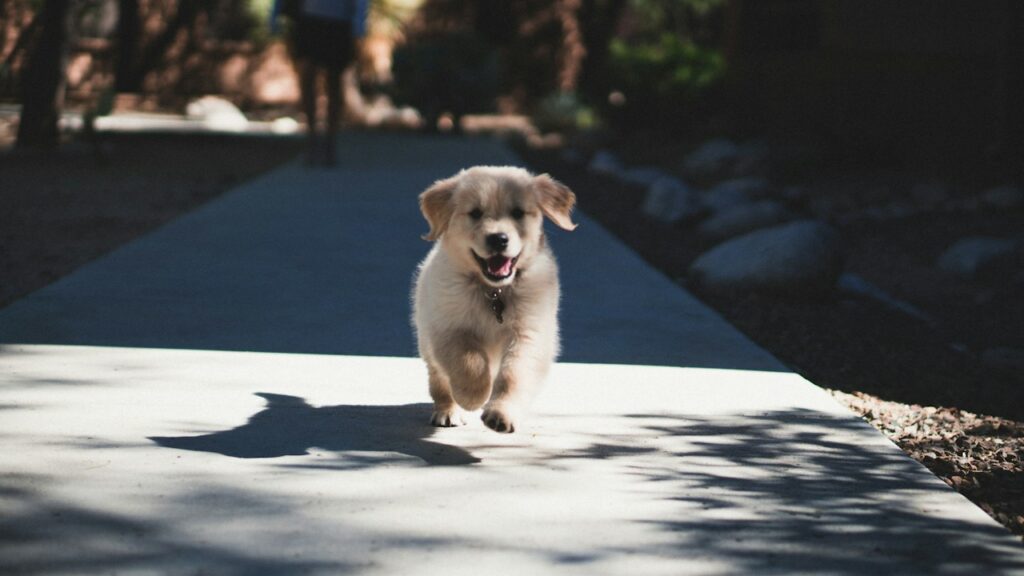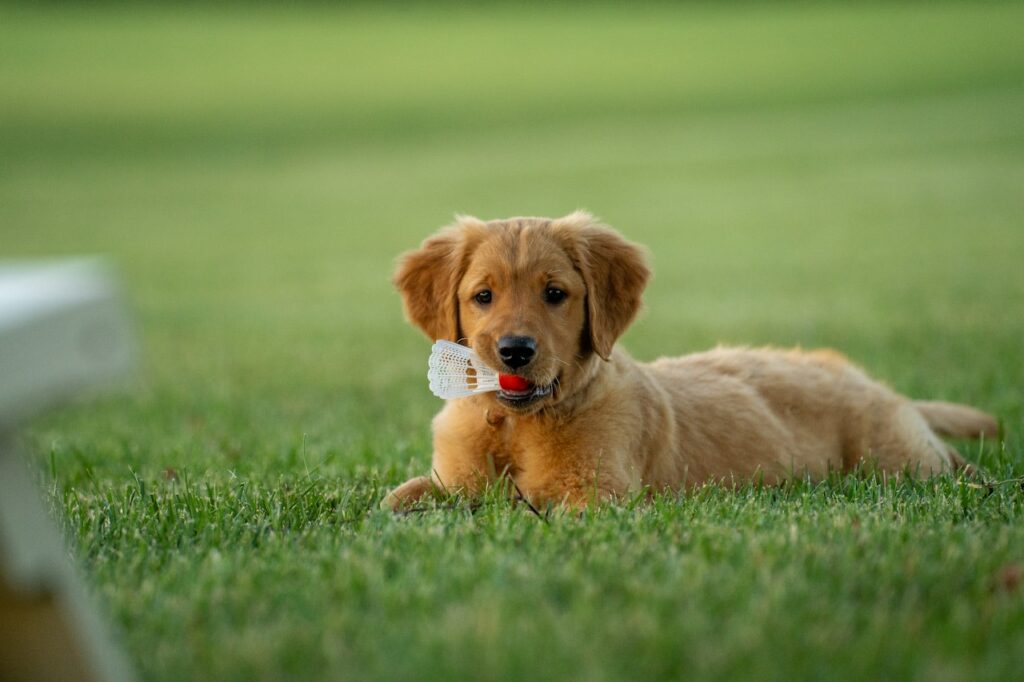Puppies not growing can happen for different reasons, and it might be a bit tricky. Let’s talk about them step by step.
Taking care of a puppy means keeping an eye on their health and how much they grow. If your puppy isn’t growing enough, it’s super important to notice it.
Then, we can figure out why puppy does not grow and do the right things to help them. If you’re new to this, don’t worry! This article is here to help you understand.
If you’ve got a puppy, you already know a bit about how they grow. It’s crucial to understand your dog’s features and watch how they change as they get closer to being a grown-up dog.
Every dog breed is different, and they all grow in their way – both in their bodies and minds. While some puppies are considered “adults” when they turn one, it doesn’t mean they’re done growing. Some dogs, especially the big ones, keep growing even after they’re one year old.
Table of Contents

The possible causes why puppy does not grow
But what if your puppy isn’t growing or stops growing altogether? This can happen for different reasons, and we need to take them seriously. Sometimes, these reasons might be connected, and we shouldn’t ignore them unless we find out that the puppy has already reached its full growth for its breed. If not, we should do something to help the puppy grow, if it’s possible.
1. Bad nutrition
Taking Care of Your Puppy’s Food
Feeding your puppy is super important for its health, especially when it’s still a little one. But don’t worry too much – it’s not very likely that mistakes in how you feed your puppy will make it stop growing.
For example, if you switch to adult dog food a bit early or give your puppy smaller portions, it’s not likely to make it stop growing. Even the treats made for grown-up dogs are made to provide all the important stuff your puppy needs. Of course, it’s still important to fix these mistakes and not make them a habit.
Extreme situations where a puppy doesn’t get enough food could lead to serious health problems, but this is rare. If you give your puppy love and take care of it in a family that pays attention to its needs, it’s not likely to stop growing because it’s a bit smaller than usual.
2. Understanding Liver Shunts in Puppies
The portal vein is like a big blood highway that gathers blood from the stomach, pancreas, and spleen, sending it to the liver for cleaning. But sometimes, a liver shunt happens when there’s a connection between the portal vein and another vein, causing the blood to skip the liver.
This issue is usually something a puppy is born with. When mammals are in their mom’s belly, they have a big shunt called the venous duct that helps blood get to the heart without going through the liver. This duct closes on its own after birth because the baby doesn’t need it anymore. But if it stays open or if another blood vessel opens outside the liver, a hepatic shunt occurs.
Signs of this problem include a small size in the puppy and strange behaviors like being confused, staring into space, or pressing the head against the wall. Seizures can also happen. Sometimes, there are other signs like throwing up, having diarrhea, or drinking and peeing too much.
Certain dog breeds, like Yorkshire Terriers, Bobtails, Irish Greyhounds, Cairn Terriers, and Beagles, seem to have this issue more often. However, it can affect puppies of any breed and might show up as they get older.

3. A Rare Puppy Condition: Congenital Hypothyroidism
There’s a rare condition in puppies called congenital hypothyroidism. It’s not common, and we don’t know how often it happens because it’s not easy to diagnose. This condition means the puppy has trouble or can’t make enough thyroid hormones, and it usually shows up when they’re still little.
When a puppy has this, it can lead to some unusual things happening in their development, like their bones not growing strong enough. They might end up being smaller than they should be, both in their body and how they think. Besides that, there are other signs like feeling very tired, not wanting to eat, losing hair, and not moving as well.
At first, these signs might not be too strong, but they can get worse as time goes on.
4. Look Out for Parasites!
Did you know that a common reason a puppy might not grow well is because of parasites? These are tiny bugs that can make the puppy sick, and they usually get them from their mom or the places they hang out. The types of parasites we’re talking about are:
1. Hookworms
2. Roundworms
3. Tapeworms
4. Giardia
5. Coccidia
These bugs can go inside the puppy’s tummy or heart, and they keep multiplying, making the puppy feel bad. Because they take away the good stuff the puppy needs to grow, they can even stop the puppy from getting bigger.
It’s quite common for dogs to get these parasites, but it’s even more important to check puppies with the vet. If you see signs like a big belly, being very tired, or not wanting to eat, it’s crucial to go to the vet.

5. Pituitary Dwarfism – A Rare Condition
Now, let’s talk about a sporadic reason why a puppy might not grow much – it’s called pituitary dwarfism. This is something the puppy is born with, and it means the puppy’s body doesn’t make enough of a special hormone that helps it grow.
Around two months old, the puppy might show signs like not growing well, problems with its fur (it might even lose hair), and issues with its skin and private parts. This disease is most common in German Shepherds and dogs related to them, but it has also been seen in other breeds like Weimaraners, Dwarf Pinschers, Karelian Bear Dogs, and Spitz. If you notice these signs, it’s important to see a vet.
Other Things that Can Affect a Puppy’s Growth
There are some other health issues that we shouldn’t ignore because they can slow down a puppy’s growth. These problems can show up in the first few months of their life and can be linked to how their body works.
Some of these issues involve the stomach and kidneys, like problems with absorbing important stuff like calcium and phosphorus. There’s also something called diabetes mellitus, where the puppy’s body doesn’t make enough insulin, which is needed for good development. All of these can cause a delay in the puppy’s growth.
Spaying a puppy too much can result in stunted growth
Some dog owners think that spaying their puppy too soon might stop them from growing, but that’s not exactly true. However, spaying or neutering too early, especially in big dogs, can cause joint issues.
When a puppy is spayed or neutered too early, it delays the closing of the growth plates in their bones. This makes them grow more than they should, especially compared to dogs that are spayed later. This might lead to the dog growing, causing joint problems.
Even too much running around and playing won’t by itself stop your little friend from growing, but it can also harm the growth plates in their long bones, causing their limbs to develop.
It’s important to know that these issues affect big dog breeds. Make sure to talk to your vet to figure out the right time to spay or neuter your puppy and how much exercise they should have before becoming an adult.

What to do in case of stunted growth
If you notice your puppy is not growing or is growing much slower than usual, it’s crucial to take it seriously. Don’t wait—go to the vet right away with your furry friend to figure out what’s going on and how to fix it.
Because these problems can be complicated and sometimes connected, it’s not easy to find out what’s wrong without the help of a vet. Trying to figure it out on your own might waste time, and your puppy could miss the chance to get better. It’s better to trust an expert who knows how to find the right answers.
For things like parasites, a simple check of your puppy’s poop can help determine what’s causing the problem. The good news is that often, treating the parasites can make your puppy healthy and happy again. But remember, preventing these issues is much better than dealing with them later.
For hormonal imbalances like hypothyroidism, the only solution is to give the puppy thyroid hormones for its whole life. Regular vet visits help adjust the doses and make sure the treatment is working. A similar treatment goes for pituitary dwarfism, which can’t be completely fixed, but the therapy can improve the dog’s quality of life.
Dealing with a portosystemic shunt is more complicated. In the congenital form, surgery is preferred, along with medication before the surgery to reduce symptoms and a special diet to limit toxins absorbed from the intestine.
Choosing a well-balanced diet is crucial to provide the puppy with essential nutrients. Antibiotics and lactulose help protect against toxins by controlling bacteria in the intestine and modifying its pH. These steps can make the environment less favorable for harmful bacteria.
